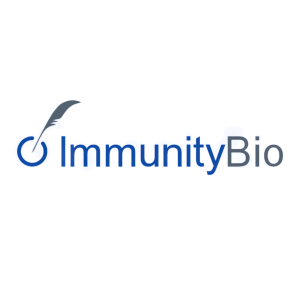ImmunityBio’s ANKTIVA® Reverses Lymphopenia and Extends Overall Survival in Patients With Advanced Non-Small Cell Lung Cancer Resistant to Checkpoint Therapy
- Severe lymphopenia, an adverse treatment effect associated with chemotherapy, radiotherapy, and immunotherapy, significantly lowers overall survival in non-small cell lung cancer and multiple types of cancer.1,2
-
With ANKTIVA, the first FDA-approved lymphocyte-stimulating agent,
80% of patients exceeded or maintained absolute lymphocyte count (ALC) above 1,000 cells/µL. - With ALC counts greater than 1,500 cells/µL, statistically significant prolonged median overall survival (OS) of 21.1 months occurred with patients alive ranging as long as over 4 years in stark contrast to the historical 7 to 9 months survival with docetaxel in these patients with advanced lung cancer.
-
Findings from the Phase 2 QUILT-3.055 study presented at IASLC 2025 World Conference on Lung Cancer in
Barcelona, Spain represent a paradigm change in a chemotherapy-free treatment of lung cancer by activating Natural Killer cells and T cells, the lymphocytes key to inducing cancer cell death. - Patients are currently being enrolled in the randomized Phase 3 ResQ201A trial (NCT06745908), which is evaluating ANKTIVA + tislelizumab, a checkpoint inhibitor versus docetaxel alone in second-line NSCLC patients who have progressed after all standard therapies, including checkpoint inhibitors.
Severe lymphopenia (loss of cancer-killing natural killer cells and T cells), is defined by the absolute lymphocyte count (ALC) of less than 1,000 lymphocyte cells/µL. This lowered ALC count is caused by the side effects resulting from current standards of treatment with radiotherapy, chemotherapy and immunotherapy, and is associated with reduced survival across all tumor types.1,2 Although reduced ALC is a recognized risk factor in a many cancers, it has largely been overlooked because no therapies have been approved to address lymphopenia. ANKTIVA is the first therapy under investigation specifically for this purpose.
“These results present the clinical evidence that a low lymphocyte count, as measured by ALC levels, is an actionable, accessible biomarker to identify and treat therapy-induced lymphopenia in cancer patients with ANKTIVA and prolong overall survival,” said Dr. Patrick Soon-Shiong, Founder, Executive Chairman and Global Chief Scientific and Medical Officer of ImmunityBio. “ANKTIVA is the first FDA-approved immunotherapy to stimulate natural killer cells, CD4+ CD8+ T cells and memory T cells, the very cells that are depleted resulting in lymphopenia, and that play a key role in the immune system’s fight against cancer. It is my belief that treating lymphopenia in patients with low NK and T cell count, is as essential as the well-established treatment of anemia (low red blood cells count) or of neutropenia (low neutrophil count), which occur as a consequence of chemotherapy, independent of tumor types. By taking this approach, we hope to herald in the paradigm change of treating the immune system itself and thereby allow the immune system to cure the cancer, regardless of its anatomical location. The long-term survival demonstrated in patients with bladder cancer and now in lung cancer provide evidence of the potential validity of this hypothesis, with ANKTVIA as the foundation of the BioShield™ platform.”
Specific findings from the Phase 2 QUILT-3.055 study include:
-
Participants with a baseline ALC≥1,200 cells/µL and a group mean ALC≥1500 cells/µL at each on-treatment time point (N=44) had greater prolonged OS (21.1 months,
95% CI: 13.9. 42.1) -
mOS for study participants with NSCLC, including patients in second line (
51% ) and third line-plus treatment (49% ), was 14.3 months (95% CI 11.7, 17.4), with 23 of 86 participants alive at data cutoff (December 2024) -
Among patients treated with ANKTIVA,
80% (69 of 86) exceeded an ALC of 1,200 cells/µL, with mOS of 15.8 months (95% CI 12.6, 21.9) compared to participants who failed to achieve ALC>1,200 cells/µL with mOS of 11.5 months (95% CI 4.2, 13.3); p=0.0057 -
60% of participants (25/42) treated with ANKTIVA reversed their lymphopenia during at least one on-treatment timepoint. - The randomized Phase 3 ResQ201A trial (NCT06745908) is evaluating ANKTIVA + tislelizumab, a checkpoint inhibitor, versus docetaxel alone in second-line NSCLC patients who have progressed after all standard therapies, including checkpoint inhibitors. Patients interested in enrolling can inquire at CSSIFM.org.
The Phase 2 QUILT-3.055 study (NCT03228667) enrolled participants with advanced NSCLC who had developed resistance to checkpoint inhibitor immunotherapy (CPI). Participants continued treatment with the same CPI on which they had progressed, combined with ANKTIVA, to test the hypothesis that AKNTIVA could improve overall survival by reversing lymphopenia and maintaining median ALC≥1,200 cells/µL. The primary endpoint was the change in ALC, including absolute cell count and percentage change from baseline, with ANKTIVA plus CPI during the study and its relationship to mOS. Statistical differences between OS among participants who failed to reverse lymphopenia (ALC<1,200 cells/µL) during treatment vs. those who had a baseline ALC≥1200 cells/µL and maintained a group mean ALC≥1,500 cells/µL while on treatment were compared. The study also assessed the proportion of participants with lymphopenia reversal (baseline ALC<1,200 cells/µL and at least one on-treatment ALC≥1,200 cells/µL).
ANKTIVA is currently approved by the
About ANKTIVA® (nogapendekin alfa inbakicept-pmln)
The cytokine interleukin-15 (IL-15) plays a crucial role in the immune system by affecting the development, maintenance, and function of key immune cells—NK and CD8+ killer T cells—that are involved in killing cancer cells. By activating NK cells, ANKTIVA® overcomes the tumor escape phase of clones resistant to T cells and restores memory T cell activity with resultant prolonged duration of complete response. A key component in the company’s BioShield platform, ANKTIVA is a first-in-class IL-15 agonist IgG1 fusion complex, consisting of an IL-15 mutant (IL-15N72D) fused with an IL-15 receptor alpha, which binds with high affinity to IL-15 receptors on NK, CD4+, and CD8+ T cells. This fusion complex of ANKTIVA® mimics the natural biological properties of the membrane-bound IL-15 receptor alpha, delivering IL-15 by dendritic cells and driving the activation and proliferation of NK cells with the generation of memory killer T cells that have retained immune memory against these tumor clones.
IMPORTANT SAFETY INFORMATION
INDICATION AND USAGE: ANKTIVA® is an interleukin-15 (IL-15) receptor agonist indicated with Bacillus Calmette-Guérin (BCG) for the treatment of adult patients with BCG-unresponsive non-muscle invasive bladder cancer (NMIBC) with carcinoma in situ (CIS) with or without papillary tumors.
WARNINGS AND PRECAUTIONS: Risk of Metastatic Bladder Cancer with Delayed Cystectomy. Delaying cystectomy can lead to the development of muscle-invasive or metastatic bladder cancer, which can be lethal. If patients with CIS do not have a complete response to treatment after a second induction course of ANKTIVA® with BCG, reconsider cystectomy.
DOSAGE AND ADMINISTRATION: For Intravesical Use Only. Do not administer by subcutaneous or intravenous routes.
Please see the complete Indication and Important Safety Information and Prescribing Information for ANKTIVA® at Anktiva.com.
References: |
|
1. |
Grossman, et al. Survival in Patients With Severe Lymphopenia Following Treatment With Radiation and Chemotherapy for Newly Diagnosed Solid Tumors. J Natl Compr Canc Netw. 2015 Oct;13(10):1225 |
2. |
Zhang Y, et al. Influence of treatment-related lymphopenia on the efficacy of immune checkpoint inhibitors in lung cancer: a meta-analysis. Front Oncol. 2023 Dec 1;13:1287555. |
About ImmunityBio
ImmunityBio is a vertically-integrated commercial stage biotechnology company developing next-generation therapies that bolster the natural immune system to defeat cancers and infectious diseases. The Company’s range of immunotherapy and cell therapy platforms, alone and together, act to drive and sustain an immune response with the goal of creating durable and safe protection against disease. Designated an FDA Breakthrough Therapy, ANKTIVA is the first FDA-approved immunotherapy for non-muscle invasive bladder cancer CIS that activates NK cells, T cells, and memory T cells for a long-duration response. The Company is applying its science and platforms to treating cancers, including the development of potential cancer vaccines, as well as developing immunotherapies and cell therapies that we believe sharply reduce or eliminate the need for standard high-dose chemotherapy. These platforms and their associated product candidates are designed to be more effective, accessible, and easily administered than current standards of care in oncology and infectious diseases. For more information, visit ImmunityBio.com (Founder’s Vision) and connect with us on X (Twitter), Facebook, LinkedIn, and Instagram.
Forward Looking Statements
This press release contains forward-looking statements within the meaning of the Private Securities Litigation Reform Act of 1995, such as statements regarding clinical trial data and potential results and implications to be drawn therefrom, clinical trial enrollment, timing, data and potential results to be drawn therefrom, the belief that ALC levels and NLR levels obtained from a CBC are predictors of clinical benefit and outcomes relating to overall survival, the belief that improving ALC levels and NLR levels correlates with enhanced overall survival and clinical benefit, the belief that reversal of lymphopenia correlates with improved survival, potential patient populations and implications thereof, the development of therapeutics for cancer and infectious diseases, potential benefits to patients, potential treatment outcomes for patients, the described mechanism of action and results and contributions therefrom, potential future uses and applications of ANKTIVA alone or in combination with other therapeutic agents across multiple tumor types and indications, including without limitation NSCLC and lymphopenia, and for potential applications beyond oncology, potential regulatory pathways and the regulatory review process and timing thereof, the application of the Company’s science and platforms to treat cancers or develop cancer vaccines, immunotherapies and cell therapies that have the potential to change the paradigm in cancer care, and ImmunityBio’s approved product and investigational agents as compared to existing treatment options, among others. Statements in this press release that are not statements of historical fact are considered forward-looking statements, which are usually identified by the use of words such as “anticipates,” “believes,” “continues,” “goal,” “could,” “estimates,” “scheduled,” “expects,” “intends,” “may,” “plans,” “potential,” “predicts,” “indicate,” “projects,” “is,” “seeks,” “should,” “will,” “strategy,” and variations of such words or similar expressions. Statements of past performance, efforts, or results of our preclinical and clinical trials, about which inferences or assumptions may be made, can also be forward-looking statements and are not indicative of future performance or results. Forward-looking statements are neither forecasts, promises nor guarantees, and are based on the current beliefs of ImmunityBio’s management as well as assumptions made by and information currently available to ImmunityBio. Such information may be limited or incomplete, and ImmunityBio’s statements should not be read to indicate that it has conducted a thorough inquiry into, or review of, all potentially available relevant information. Such statements reflect the current views of ImmunityBio with respect to future events and are subject to known and unknown risks, including business, regulatory, economic and competitive risks, uncertainties, contingencies and assumptions about ImmunityBio, including, without limitation, (i) risks and uncertainties regarding participation and enrollment and potential results from the clinical trial described herein, (ii) whether clinical trials will result in registrational pathways, (iii) whether clinical trial data will be accepted by regulatory agencies, (iv) the ability of ImmunityBio to fund its ongoing and anticipated clinical trials, (v) the ability of ImmunityBio to continue its planned preclinical and clinical development of its development programs through itself and/or its investigators, and the timing and success of any such continued preclinical and clinical development, patient enrollment and planned regulatory submissions, (vi) potential delays in product availability and regulatory approvals, (vii) ImmunityBio’s ability to retain and hire key personnel, (viii) ImmunityBio’s ability to obtain additional financing to fund its operations and complete the development and commercialization of its various product candidates, (ix) potential product shortages or manufacturing disruptions that may impact the availability and timing of product, (x) ImmunityBio’s ability to successfully commercialize its approved product and product candidates, (xi) ImmunityBio’s ability to scale its manufacturing and commercial supply operations for its approved product and future approved products, and (xii) ImmunityBio’s ability to obtain, maintain, protect, and enforce patent protection and other proprietary rights for its product candidates and technologies. More details about these and other risks that may impact ImmunityBio’s business are described under the heading “Risk Factors” in the Company’s Form 10-K filed with the
View source version on businesswire.com: https://www.businesswire.com/news/home/20250908610169/en/
ImmunityBio Contacts:
Investors
Hemanth Ramaprakash, PhD, MBA
ImmunityBio, Inc.
+1 858-746-9289
Hemanth.Ramaprakash@ImmunityBio.com
Media
Sarah Singleton
ImmunityBio, Inc.
+1 415-290-8045
Sarah.Singleton@ImmunityBio.com
Source: ImmunityBio, Inc.







